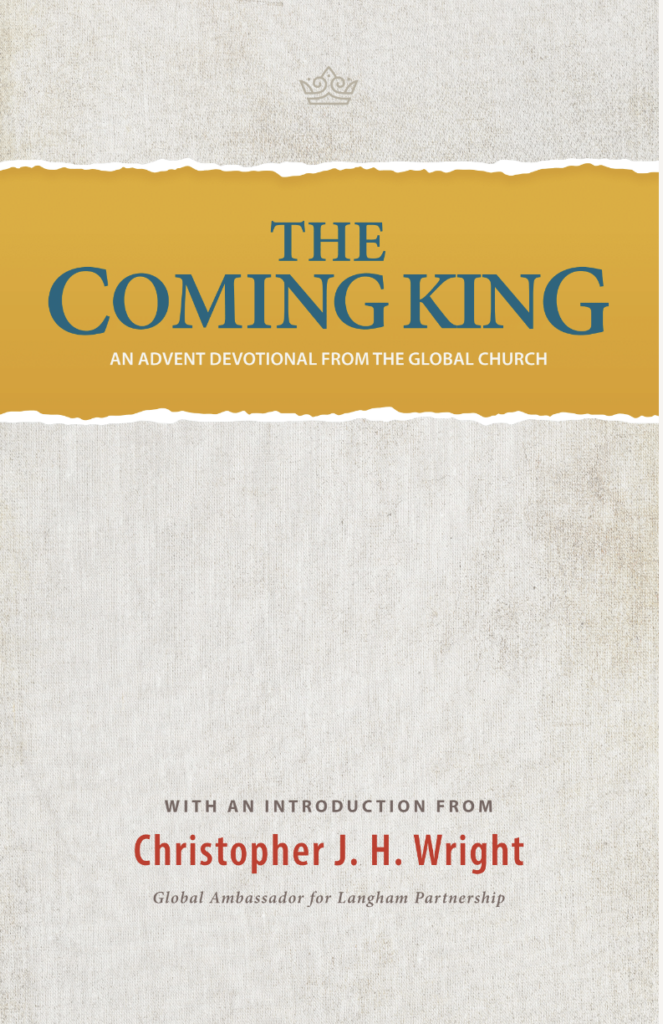An Advent reflection from the Middle East

By Karla*, a teacher and elder in the Middle East
On Isaiah 52:13–53:12
An excerpt from “The Coming King: An Advent Devotional from the Global Church”
Growing up and living in the Middle East as a Christian, I learned to expect responses that varied from criticisms about the Crusades to judgments on eating pork and the affluence of the Western lifestyle. In the minds of my friends, Christianity had nothing to do with any kind of suffering.
If anything, Christians were considered the guilty party causing suffering or injustice. Much could be said about the mix of truth and misinformation surrounding these reactions, but it would be fair to say that suffering is not the first thing that comes to mind when people think of Christianity and Christians. And yet the Christ we follow is the crucified one, the suffering servant of whom the prophet Isaiah speaks in such stark and moving terms.
He was despised and rejected by mankind, a man of suffering, and
familiar with pain. Like one from whom people hide their faces he was
despised, and we held him in low esteem.
— Isaiah 53:3
A suffering servant
Christ Jesus came into the world to be oppressed and afflicted for the sake of our healing. This is not a truth we can brush aside as something that only happened for a moment on the cross. This truth of Christ as the suffering servant is at the core of the incarnation. It is at the core of how God chose to reveal Himself to mankind so that the nations would see what they were not told and understand what they had not heard (Isaiah 52:15b).
Read more: An Advent devotional from a church leader in Poland
Isaiah seems to imply that it is in the very suffering of God’s chosen one that He is revealed to the nations. What an amazing thought! The God of the universe revealed Himself to the nations as the man of sorrows, telling the nations that He knows what it’s like to be humbled and humiliated, to feel pain, to be betrayed, to be misunderstood and treated unfairly, even to die; telling them that He was willing to suffer all of this because such love was the only way to be close to them and ransom them from sin.
A sacrificial love

This sacrificial love is what shaped Jesus’ life on earth because it is who God has been from the very beginning, ever since we went astray deciding to turn to our own way. God has suffered with us through every generation as we’ve experienced violence, fear of the future, enslavement, war, injustice, political instability, corruption, poverty — troubles we see all over the Bible and history and troubles that feel very close to home right now. God suffers with us. And actually, that is good news. This is the good news that my people need to hear. This gospel is what Christianity should look like.
In a world where people will spend thousands to look more attractive in the hopes of drawing others to themselves or attaining some sort of twisted standard, Isaiah says that the suffering servant “had no beauty or majesty to attract us to him, nothing in his appearance that we should desire him” (Isaiah 53:2b).
The beauty of pierced hands
Yet it feels sometimes that we have tried to dress our gospel up to look more attractive and desirable, ignoring the suffering servant and acting as if we’ve already arrived at the place of rest. But Advent reminds us that we are still waiting, still wandering, still suffering, still fixing our eyes on the horizon to see the coming one.
Let us abandon the effort to try to make our Christ more “attractive” to our wounded world that looks into a broken mirror. Let us reveal the beauty of His pierced hands of healing and the gracefulness of His wounded back carrying our sorrows. Let us not hide our faces as we look upon our Christ who suffers, lest the nations think that God is not familiar with suffering.
This Advent, may we remember that we still wait. We wait for the Lamb that went to the slaughter who is gathering His offspring. We wait for the nations to see what they were not told and understand what they have not heard: That Jesus is the suffering servant who suffers and mourns with and for them so that suffering may be no more. Rejoice, rejoice! Emmanuel is the suffering servant who comes to thee.
*Details withheld for security reasons.
